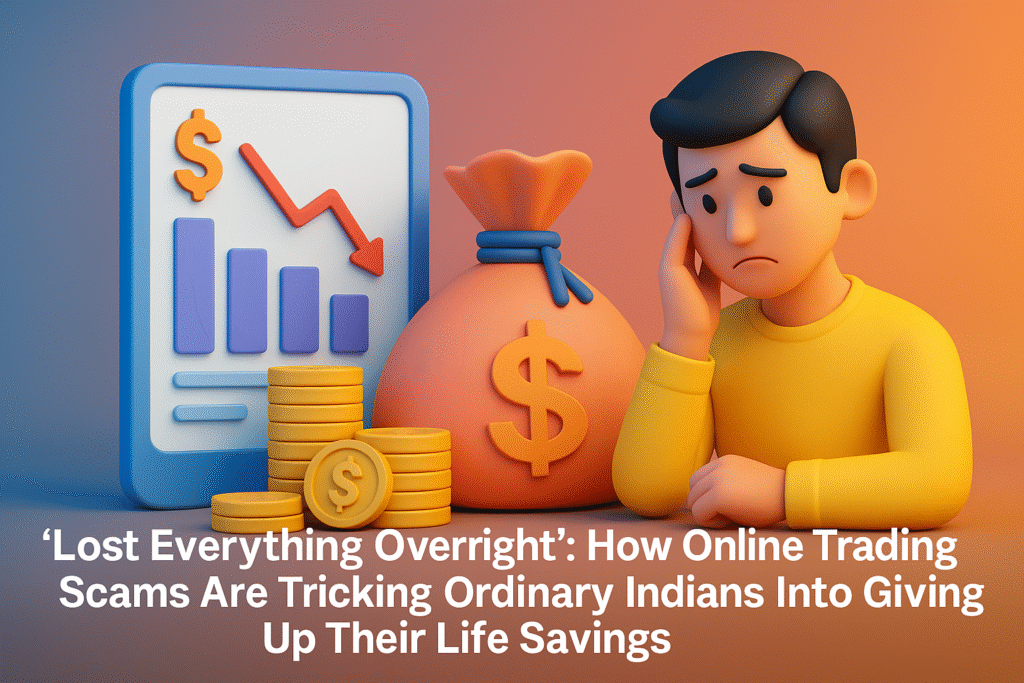Online trading scams in India are rising rapidly due to fake apps, WhatsApp traps, and high-return promises. Learn how these scams work — and how to protect yourself.
In today’s digital-first economy, online trading offers convenience, speed, and profit potential. But for many unsuspecting Indians, it’s becoming a trap — not a ticket to wealth.
Online trading scams have exploded across India, using slick mobile apps, deepfake celebrity endorsements, and manipulative social tactics to exploit financial hopes — especially among the digitally untrained and economically vulnerable.
And make no mistake: these scams are getting smarter.
How Do Online Trading Scams Work?
“Fraudsters no longer look like fraudsters. They look like opportunity.”
Here’s how they’re pulling it off in 2025:
1. Fake Trading Apps & Websites
Scammers create professional-looking platforms that mimic trusted apps. These fake dashboards show fabricated profits to build investor trust — sometimes even crediting small gains into real accounts at first.
2. WhatsApp & Telegram Traps
Victims are added to “exclusive” groups promising insider tips. Fake members (bots or planted actors) post screenshots of massive profits, creating peer pressure and the illusion of success.
3. Celebrity Impersonation
Images of icons like Ratan Tata, Mukesh Ambani, or Sachin Tendulkar are illegally used to give fake platforms a sheen of legitimacy. Most victims never check if these endorsements are real.
4. Unrealistic Returns
Promises of 5–10% daily returns are used to entice first-time investors. Once the victim deposits a large amount, the app or website suddenly stops working, blocks the user, or disappears entirely.
Why Do People Still Fall for These Scams?
Even as awareness grows, several factors keep these scams alive and thriving:
- Financial Illiteracy: Many mid-age and senior users don’t understand risk-return dynamics.
- Post-Pandemic Desperation: With income sources reduced, many seek “quick money” options.
- Digital Naivety: Victims fail to vet apps, verify sources, or check legal status.
- Social Proof Pressure: Seeing others “win” in groups convinces people it’s safe.
- Greed vs. Caution: The lure of fast cash often overrides logic and red flags.
How to Stay Safe from Online Trading Scams
You don’t need to avoid trading — just avoid unverified platforms and impossible promises. Here’s how:
✅ Use SEBI-Registered Platforms
Stick to trusted, regulated platforms like Zerodha, Groww, Upstox, or ICICI Direct.
✅ Verify Apps Before Downloading
Check developer info, app reviews, permissions, and install count.
✅ Avoid Anyone Promising Guaranteed Profits
No legitimate trading platform offers guaranteed daily or monthly returns.
✅ Never Share Sensitive Info on Chat
Don’t reveal your Aadhaar, PAN, OTPs, or bank account details to anyone online.
✅ Report Immediately
File a report at cybercrime.gov.in or visit your local cyber cell.
Real Cases, Real Losses
In several known cases, victims have lost life savings, pensions, or emergency funds to fake trading platforms. Even the police often face challenges recovering the funds, especially when the fraud is run from overseas or via complex money laundering networks.
If you think, “It won’t happen to me,” — that’s exactly when you’re most at risk.
Final Takeaway
The world of online trading is legitimate — but only when accessed through proper, regulated channels. If someone offers you double returns in 7 days, they’re not a financial advisor — they’re a con artist.
Greed is what fraudsters count on. Awareness is your only real defence.
Stay informed. Stay sceptical. And always do your due diligence before you invest a single rupee.

